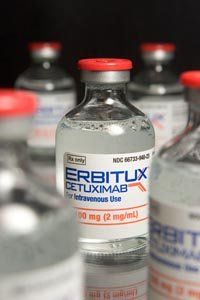Treatment Combo for EGFR Inhibitor-Resistant Lung Cancer
Combining the EGFR inhibitors afatinib and cetuximab resulted in clinical responses among advanced lung cancer patients who had previously stopped responding to monotherapy treatment with other EGFR inhibitors.
Combining afatinib and cetuximab resulted in clinical responses in pretreated lung cancer patients.

The combination of two epidermal growth factor receptor (EGFR) targeted therapies showed clinical responses among advanced lung cancer patients who had previously stopped responding to monotherapy treatment with other EGFR inhibitors. Twenty-nine percent (37 patients) of the 126 patients on the clinical trial responded to treatment with afatinib, an oral EGFR inhibitor, plus cetuximab, an EGFR-targeted monoclonal antibody. The results of the phase 1b clinical trial were published in Cancer Discovery.
This study demonstrated that a significant portion of patients with EGFR-mutated lung cancer resistant to the EGFR-targeted therapies gefitinib or erlotinib have tumors that remain dependent on EGFR signaling.
The median progression-free survival was 4.7 months and the median duration of confirmed objective response was 5.7 months (range of 1.8–24.4 months). Response rates were seen for 20 (25%) of the patients by the fourth week of treatment. The median duration of therapy was 4.8 months, with one patient treated for 29.1 months.
While EGFR-mutated lung cancers initially respond to EGFR-targeted oral therapies, the majority of patients develop resistance. Currently, there are no therapies available for these patients. More than 50% of these acquired resistance cases are due to a secondary mutation within the EGFR gene-the T790M mutation.
Preclinical studies have shown that combining afatinib and cetuximab can overcome this T790M-mediated resistance. Of the 124 patients for whom the EGFR mutation status was known, 57% were T790M-positive. The objective response was comparable in T790M-positive and T790M-negative tumors (32% and 25%, respectively; P = .341).
“Importantly, the afatinib/cetuximab combination benefited patients whether or not their cancer had acquired resistance to erlotinib or gefitinib as a result of a secondary mutation in EGFR called T790M,” said study author Yelena Y. Janjigian, MD, of Memorial Sloan Kettering Cancer Center in New York City, in a statement.
All of the patients on the trial had previously received either erlotinib or gefitinib, and 79% of patients had also received chemotherapy. Patients were treated at the maximum tolerated dose of 40 mg of afatinib daily plus 500 mg/m2 of cetuximab given intravenously every 2 weeks. The median age of patients on the trial was 59 years.
The most common treatment-related adverse events were rash (90%), diarrhea (71%), nail effects (57%), stomatitis (56%), fatigue (47%), and nausea (42%). High-grade treatment-related adverse events occurred in 46% of patients. The most common grade 3 adverse events were rash (20%) and diarrhea (6%). Common grade 4 events occurring in two patients were fatigue, pneumonitis, and lung infiltration. Two patients died on trial as a result of treatment-related dyspnea and pneumonitis. Thirteen percent of patients discontinued treatment due to treatment-related adverse events.
Afatinib is approved by the US Food and Drug Administration (FDA) as a monotherapy for first-line treatment of metastatic lung cancer patients whose tumors harbor either exon 19 deletions or an exon 21 (L858R) substitution in the EGFR gene. Cetuximab is approved for squamous cell carcinoma of the head and neck, as well as certain types of colorectal cancer, but is not currently approved for lung cancer patients.
According to the study authors, two randomized trials are planned to assess this combination in EGFR-mutated non–small-cell lung cancer.
This study was funded by Boehringer Ingelheim, which manufactures afatinib, and the Conquer Cancer Foundation of the American Society of Clinical Oncology.